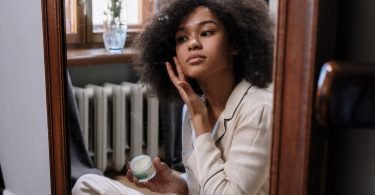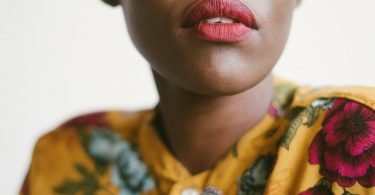Recently I have been reading more and more about how negative images online and in magazines have been affecting young girls. With the rise and rise of social media and photo editing apps such as Photoshop, it is easier than ever to manipulate a photo to within an inch of its life, and some of these are so professional and expertly done, it really is so hard to tell which one is real and which is the doctored one. And these are the ones done by you and me, by the YouTubers/Instagramers/Bloggers we all follow! Not by the experts behind that amazing spread in ELLE Magazine! These techniques have become mainstream and have found their way into everyday life. It is becoming so easy to download these photo editing apps that it is seen as the norm to push and pull a photo, brighten the background and give yourself a smaller waist! No wonder there’s been an increase in young girls seeking help for eating disorders, after trying to live up to this idealised version of perfection.
Shocking statistics
In the 12 months leading up to October 2013, there was an 8% increase in the number of eating disorder hospital admissions. The Costs of Eating Disorders – Social, Health and Economic Impacts report, commissioned by Beat (an eating disorders charity) and produced by PwC in February 2015, estimates that more than 725,000 people in the UK are affected by an eating disorder. Now of course it remains to be seen if any of these cases were linked to feeling inadequate by seeing edited pictures online, but it sure is frightening to think that any young girl (or boy – this study suggests 11% of those affected were male) suffers from any kind of eating disorder. One thing is for sure, these images cannot be helping their recovery!
Beat have been part of a Body Confidence Campaign since 2015, to highlight just how girls in schools feel about their appearance. The statistics from this are shocking:
- 1 in 6 GCSE students have avoided going to school because they feel bad about their appearance.
- Poor body image is associated with lower confidence, lower aspirations and lower social participation.
- Around 4,500 teenage girls in the UK develop an eating disorder every year.
- 1 in 5 primary school age girls say they’ve been on a diet.
- 86% of girls aged 11-21 think that women are judged more on their appearance than on their ability!
- 23% of girls aged 7-21 don’t participate in exercise because they are unhappy with their body image.
This really saddens me. How is it that our society makes children think they’re fat and that in turn means they don’t want to go to school or participate in exercise? Something needs to be done, and fast, because 725,000 people being admitted to hospital every year due to an eating disorder is a scary and heart breaking statistic.
What are magazines doing about this?
Some magazines are seeing the light and showing un-retouched versions of their models, as well as using more ‘real’ models in their advertising campaigns. When I was in Australia, I picked up CLEO Magazine and was happy to see that there was an article on a model who was slightly bigger than the norm. This made me happy because I could see myself looking like this beautiful model and not feel too bad about the shape I was in. To read that she was a successful model and had a career to rival some of her peers, filled me with joy. Finally I thought, there’s a magazine out there which supports real women and isn’t afraid to use them as models!
Now whether this was because I was in Australia, where everybody lives the majority of their lives outside and are therefore healthier, remains to be seen, but what I can say is that nobody covered up on the beach or was afraid to do the walk from sun lounger to sea without covering up! This is one reason why I love that country and the ethos behind being fit, happy and healthy. The model in question is called Robyn Lawley and is the first ‘plus-size’ model to grace the cover of Sports Illustrated, Swimwear Edition. It is articles like this which I love to read, ones where the model isn’t the usual stick-thin wasp who appears to only survive on green juices and nuts. Sensible eating habits combined with a healthy approach to exercise leads to a happier and healthier you, both inside and out.
#JustAsIAm
There is one YouTuber/Blogger I admire who has set up a #JustAsIAm campaign, tackling the very problem I am talking about here. Amelia from ‘xameliax‘ posted a photo to Instagram showing before/after of her in a bikini. Many of her followers thought it was her showing the results of some new diet/exercise regime but actually Amelia was just showing how easy it was to edit a photo, with just three minutes of work in a photo editing app she had on her phone! It was unbelievable just how quickly and easily Amelia was able to trim her waist, lift her boobs, shrink her thighs and fix the warped pole behind her so it looked as perfect as possible. No wonder we all think we’re inadequate if this is how the pictures we’re bombarded with on social media are edited.
Amelia also posted a video and blog post about negativity and pressure directed towards women in the media called ‘Why Am I Not Good Enough?’
We can all get caught up in the hype, thinking we’re not good enough and believe that we need to try the latest health food or diet fad to be popular/liked/slim enough, but the truth is we’re perfect just the way we are! There is far too much negativity online, too much pressure for women (and men) to look good that sometimes it can be difficult to remain neutral. We need to remember that the most vulnerable amongst us might just need a little help to battle the demons, to be told that no, that picture you’re looking at is not real, that you’re beautiful just the way you are. As Amelia says in her video, “You do you, because you are beautiful, flaws and all!”
Body image is such a sensitive and emotive subject that sometimes it can be difficult to talk about it, but as these statistics have shown, 4,500 is a lot of teenagers suffering, quite often in silence. We need to be their voice and boost their confidence – remind them that in fact, they ARE good enough and they ARE beautiful. With influencers such as Amelia starting up her #JustAsIAm campaign, I’m a lot more positive about the future for young people.
Have you seen images in the media and online which you think could lead to negative views on body image? Let us know in the comments below.








